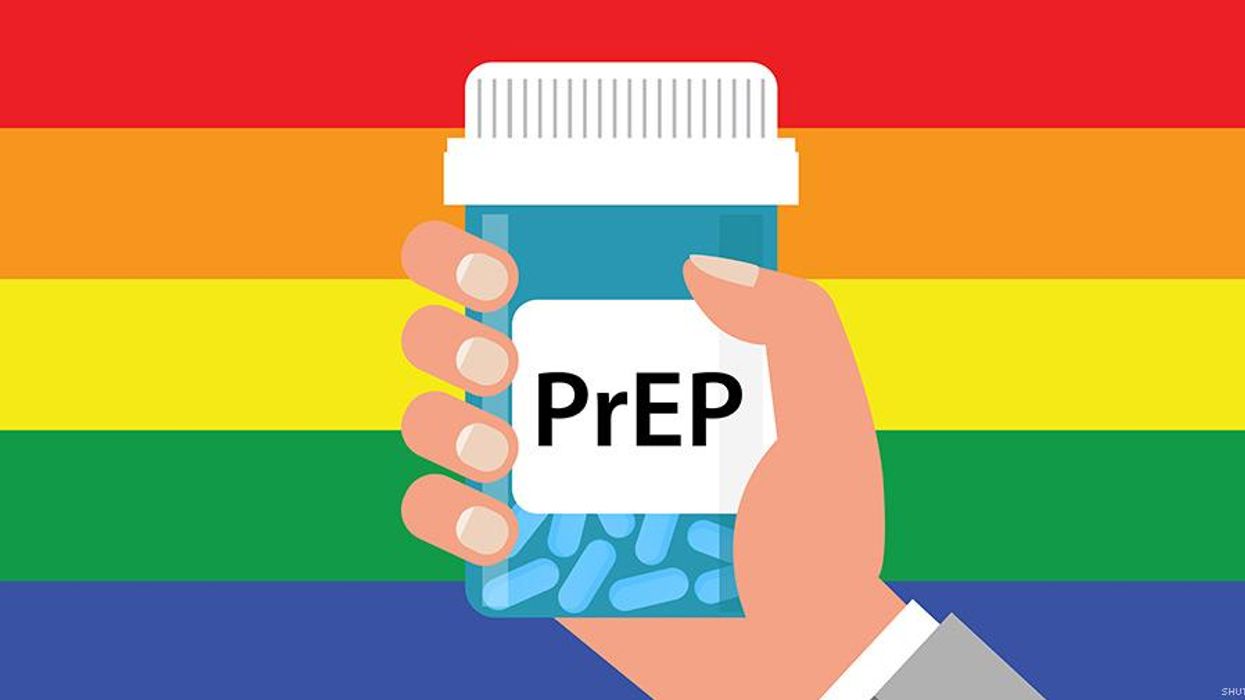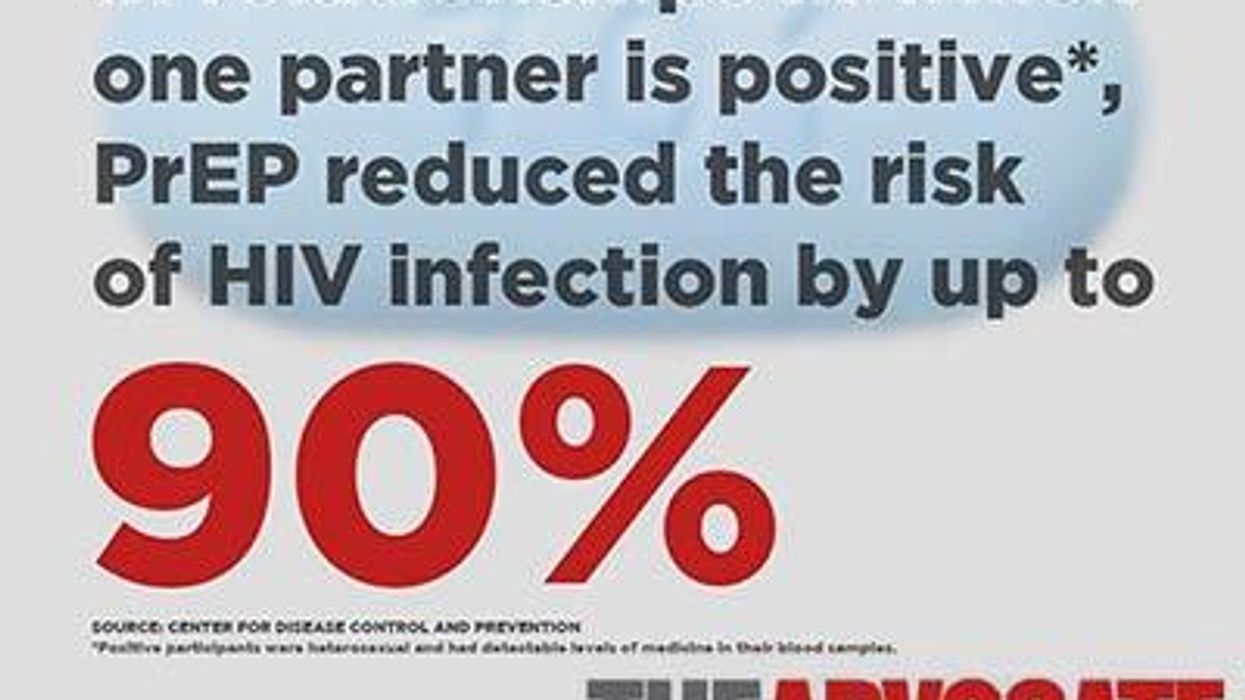It has been recommended that gay and bisexual men consider taking pre-exposure prophylaxis, or PrEP, for HIV prevention, but there is one demographic that, according to many health care professionals, is an ideal candidate for this treatment: HIV-negative men with HIV-positive male partners, relationships that are referred to as serodiscordant.
For many of these couples, PrEP may offer a security in intimacy among both partners that is beneficial to physically, mentally, and emotionally, where HIV is concerned. The fear of a condom breaking during sex or not being used properly can be alleviated with the knowledge that medication taken for PrEP, when administered properly, can reduce the risk of HIV infection by 96 to 99 percent.
"PrEP has given us more ease when thinking about HIV," Patrick Buzzell, the negative half of a serodiscordant couple, told The Advocate earlier this month. "I know my husband would never want me to contract the virus from him, so this provides both of us with more comfort knowing that added level of protection is there."
With this added level of protection, the drug has also opened the doors to more serodiscordant relationships. Another PrEP user, Christopher Glazek, 29, attests to this change of social dynamic, and how PrEP has broken down barriers in his personal life. Having the ability to control his health in such a way enables him to tell positive romantic partners, "This is something that doesn't even potentially matter to me."
Still, many serodiscordant couples do not use the treatment. Kevin James, the president of the L.A.-based HIV community organization The Thrive Tribe Foundation, says there are a variety of reasons couples don't partake, including a general undereducation about the drug among the gay population. But a more problematic reason is ignorance among physicians.
Many doctors, even in major urban areas, are uninformed that the drug Truvada can be used as HIV prevention, James says, though it was approved by the Food and Drug Administration three years ago for this purpose. Most physicians are familiar with PEP (post-exposure prophylaxis), a high concentration of HIV medication that is administered (usually to other health care professionals) after exposure to the virus. But a lack of information about PrEP, combined with preconceptions about the sexual behavior of those who use it, still prevent physicians from prescribing PrEP to their patients.
"Finding doctors that will understand [PrEP] and will prescribe it for daily preventative maintenance is very difficult," James says. "One of the greatest barriers is, the medical community isn't up-to-date."
His own partner suffered because of this ignorance within the medical community. His in-network doctor delayed a PrEP prescription for several months, saying Truvada "was not meant for that purpose." By the time his new insurance took effect, James's partner tested positive for HIV, a fate that could have been avoided had his doctor been fully aware of the risks as well as the financing options available for patients in this situation.
In some cases, serodiscordant couples find PrEP unnecessary when the positive partner's viral load is undetectable, which occurs when a positive person medicates and monitors the virus to a point that it cannot be transmitted. This is known as treatment as prevention, or TASP.
Jay Gladstein, MD, an infectious diseases and HIV specialist with a private practice near West Hollywood, says TASP is effective in certain scenarios. Referencing findings from two prominent studies, HPTN 052 (which monitored heterosexual serodiscordant couples) as well as the Partners PrEP study (which monitored same-sex serodiscordant couples), Gladstein says the risk of HIV transmission is "really low, approaching zero" in a monogamous relationship where the insertive partner is negative and the receptive partner is positive and undetectable. He would ask his own patients in this scenario if PrEP is really "worth the bother," considering the compelling data and minimal risk.
However, Gladstein says if the two partners were versatile, not exclusively monogamous, or if the insertive partner were positive, he would be more likely to recommend PrEP to the negative partner.
Stigma also remains a sizable barrier to taking PrEP -- particularly intergenerational stigma. "Condoms are king" is still the philosophy among a few prominent HIV activists, including Normal Heart writer Larry Kramer and AIDS Healthcare Foundation head Michael Weinstein, who have both spoken out publicly against PrEP for fear it will lead to a decline in condom use and a rise in sexually transmitted infections, including HIV, if it is not administered properly.
"Condoms are also a very effective means of protection when used correctly," Gladstein counters. "But historically, condoms have not been effective at reducing our rates of HIV transmission nationwide."
There are male couples who have been using condoms as prevention for many years, and feel as though a switch to a drug is unnecessary. Mike and Ron, whose names have been changed for privacy, have been in a relationship for 12 years. Mike has been positive for 33 years. He is currently undetectable, but he did have a positive viral load for the first five years of his relationship with Ron. From the beginning, they have used condoms during anal sex, a strategy that has kept Ron, the receptive partner, negative for the length of their relationship.
"If people want to go on PrEP, that's fine. But I don't like this message being sent out that in order to have sex with a person with HIV, you have to be on PrEP, even if you're a couple together for years," Mike says. "PrEP is an option, but not a requirement."
Ron agrees. He also worries about side effects of taking the drug, as well as whether long-term effects will suddenly appear that haven't been found in current trials. In his view, it doesn't make sense to fix a system that isn't broken.
"Why would I take a drug when I use condoms? Condoms have a long track record of being effective," Ron says. "For me, it's medication I don't need to take," and one that, as Mike points out, he may have to take for decades, should he and his partner remain together as planned.
So far, multiple studies over several years have found the side effects of PrEP to be negligible or minimal, though they do vary by person. As the Centers for Disease Control and Prevention puts it, PrEP is just another tool in the toolkit of HIV prevention. In the end, it is up to every couple, serodiscordant or not, to determine the health and happiness strategy that fits best.
"I'll be honest. There's a part of me that thinks that people just want permission to have anonymous sex," Ron says of PrEP, evoking a common perception about the drug. "But ultimately, I think everyone should know where their risks lie and manage it differently. It's useful to have many options. I think it's more important to be protected."
Gladstein says he would tell Ron and Mike that by using condoms consistently, they are doing "a really good job of decreasing his risk of HIV and other STDs, and there's no strong need to add Truvada." However, he notes that PrEP, when taken as directed, is "probably our most effective prevention tool for HIV" and "it does not deserve the negative attention it's gotten."
"Concerns with toxicity and long-term harm have been overemphasized when they really don't exist for the most part," he says. "The bottom line is, it's a powerful tool when used correctly, and it could turn the tide in new transmissions. And that's something we've not been able to do in the past 33 years."













Charlie Kirk DID say stoning gay people was the 'perfect law' — and these other heinous quotes
These are some of his worst comments about LGBTQ+ people made by Charlie Kirk.